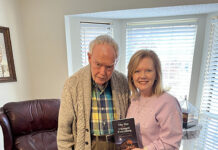Pancreatic cancer is known for its poor prognosis, though it can be potentially curable if caught early enough. The problem is pancreatic cancer usually shows little or no symptoms until it has advanced and spread. In these cases, the average pancreatic cancer survival time is three to three and a half years.
Exception to the Rule
William “Charley” Maynard of Oklahoma City has been living with the disease for 18 years. He was 46 years old when his cancer was discovered accidentally. “We had a pizza buffet at work, and I think I got food poisoning because I became extremely ill afterwards,” he remembers. “It got so bad I ended up going to the emergency room. It was there that they saw something suspicious on a scan.”
After further tests, Charley was diagnosed with pancreatic cancer. It had already metastasized to his liver. He was given two to seven months to live. “I lost it,” he admits. “I thought to myself, ‘I’m too young for this.’”
Attitude Adjustment
He acknowledges he didn’t know much about the disease then, or that it was considered by many as a death sentence. “I didn’t ask a lot of questions. I didn’t want to know all those negative things. I moped around for two or three weeks, then decided this ain’t no way to live. I made up my mind that I wasn’t going to just lay down to it. I was going to continue living my life.”
He kept working through his chemotherapy treatments that were on and off for the next several years. He is now on an oral regimen to slow the disease progression and provide comfort.
“There are certainly patients who far outlive their prognosis or even become disease-free,” says Bashar Alasad, M.D., a medical oncologist at the INTEGRIS Health Cancer Institute at INTEGRIS Health Southwest Medical Center. “Overall pancreatic cancer survival rates, while still much lower than other cancers, have gradually improved over the years. I absolutely believe that Charley’s positive attitude has played a huge role in his longevity.”
Reason for Living
“I talk to God every day and I know He’s the reason I’m still alive,” Charley confesses. “I think I’m meant to raise awareness by sharing my story. I talk to those who just got diagnosed with any type of cancer and I try to motivate them. I try to give them hope.”
He adds, “I’m 64 years old now. I’ll be 65 in January. I’m proof that you can beat this disease or at least live with it for a long time. You just got to refuse to surrender to it.”
There are not clear-cut symptoms for early-stage pancreatic cancer. However, you should see a health care provider right away if you develop jaundice, stomach or back pain, unexplained weight loss or a sudden onset of diabetes.
If you have a first-degree family member (parents or siblings) with pancreatic cancer, you should talk to your doctor about your risk of developing the disease and the current screenings and genetic tests available.















